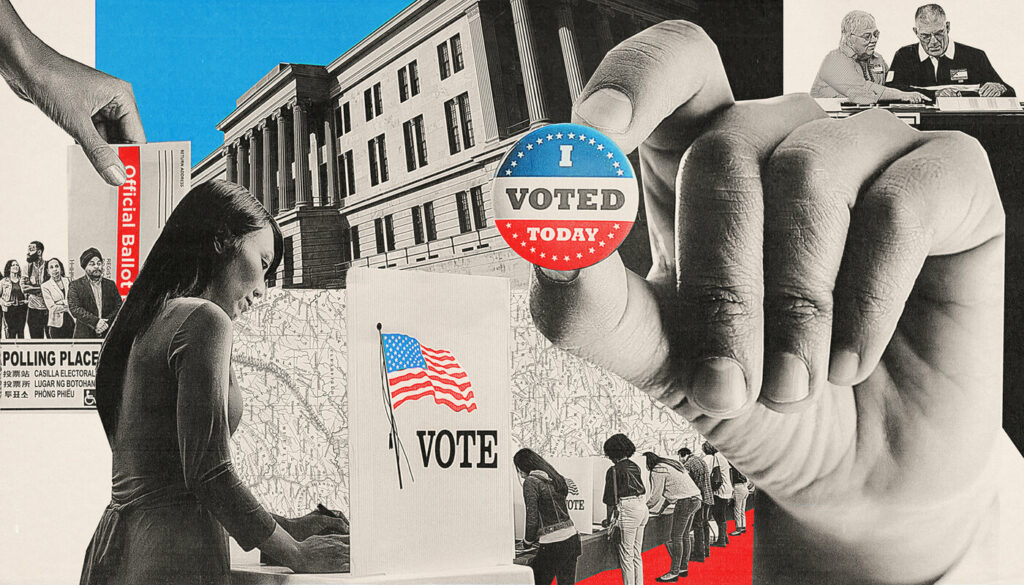How States Can Prevent Election Subversion in 2024 and Beyond
Originally published by Alice Clapman for Brennan Center for Justice
Next year, the United States will hold its first presidential election since the 2020 race and attempted coup. Many risks remain. States can shore up their systems ahead of 2024, but time is short.
The facts are still hard to believe: Nearly three years ago, President Donald Trump lost his reelection bid in an election that his own administration called “the most secure in American history.” He then denied that loss and tried to hold onto the presidency through fraud and incitement of violence. Shocking numbers of people joined him. Politicians and pundits amplified baseless theories that the election had been stolen. State and local officials refused to certify valid election results. Lawyers sought to overturn these results in court, and judges voted to do so. Federal lawmakers attempted to thwart Congress’s nominal role in counting and certifying electoral votes. Vigilantes harassed and threatened election workers and attacked the U.S. Capitol. Thanks to heroic interventions by many officials and citizens, the attempted coup failed — narrowly.
Since then, the country has made progress toward insulating future elections from subversion attempts. Most notably, Congress passed the Electoral Count Reform and Presidential Transition Improvement Act of 2022 (ECRA), closing some loopholes and resolving ambiguities that the Trump campaign tried to exploit in 2020. Among other reforms, the ECRA clarifies that only a state’s governor or other predesignated executive official may submit official election results; bars state legislatures from changing the rules for appointing electors after Election Day; and makes it harder for federal legislators to overturn election results. Several states went further. Notably, Colorado, Michigan, Minnesota, and New York clarified their certification processes and took steps to combat disinformation and protect voters and poll workers from harassment and violence.
The 2022 midterms also indicated strong public support for democracy. Election deniers — that is, those who espouse false claims that the 2020 election was stolen or that U.S. elections are riddled with large-scale fraud — lost their bids for statewide offices that would have afforded them oversight of the 2024 election in battleground states. Election denial was a losing message in much of the country. And voter confidence in the midterm outcomes was higher and less politically polarized.
Despite this progress, the United States remains at risk for election subversion (that is, the overturning of an election outcome through disruption or manipulation of the vote counting, canvassing, or certification processes, or other acts of large-scale disenfranchisement). Election denial is still rampant within federal, state, and local governmental bodies and among segments of the public. Although many of those who attacked the Capitol on January 6, 2021, have faced criminal consequences, so far the officials and politicians who incited them to violence have not. Election deniers won numerous congressional and state legislative seats, party chairs, and state and local election administrative positions. Republican activists have recruited poll workers and observers in large numbers with the false and inflammatory message that U.S. elections are being stolen and must be “taken back.”
While the ECRA included necessary reforms, Congress has failed to pass broader protections, including baseline national election standards. This failure puts the onus on states. Each state has different vulnerabilities and different options for addressing them. Every state should start with these five measures:
- Strengthen laws requiring timely certification based solely on verified vote totals, with effective enforcement mechanisms.
- Strengthen laws channeling election disputes through the state judiciary, and set clear standards governing how these disputes are resolved.
- Finalize a plan for putting out accurate information about the election process and preempting disinformation, starting well before Election Day and backed by adequate state resources.
- Bolster election administration with training, written guidance, and investment in equipment, security, scenario planning, staffing, and supplies.
- Enact stronger measures against intimidation of voters and election workers, including gun restrictions and privacy protections for election officials.
In some states, legislatures will be in session again before the 2024 vote; in others, they could be called to a special session. Elsewhere, administrative officials could implement many of these measures. And state policymakers at every level should continue to push for these reforms after 2024, because election subversion will remain a risk.
